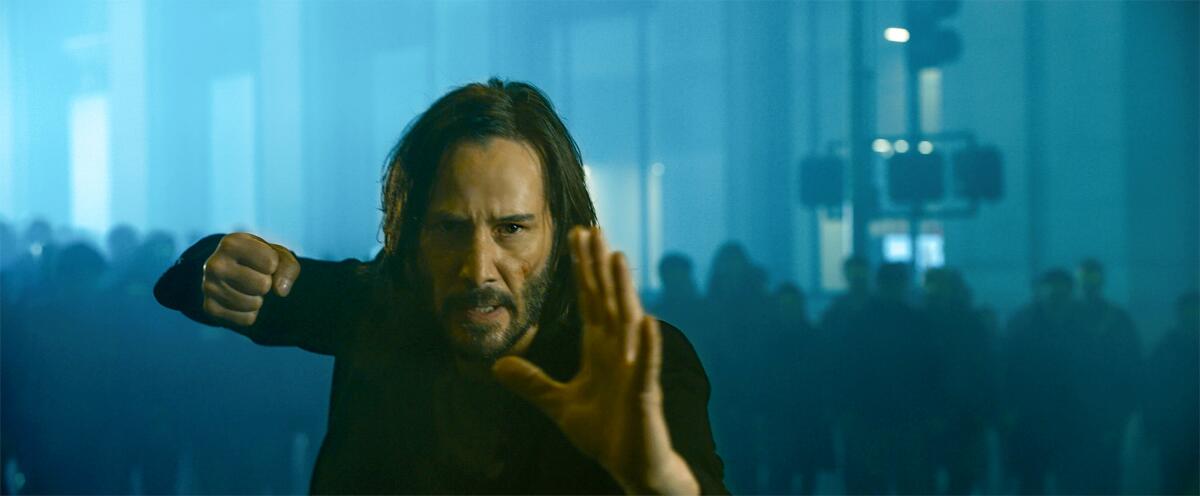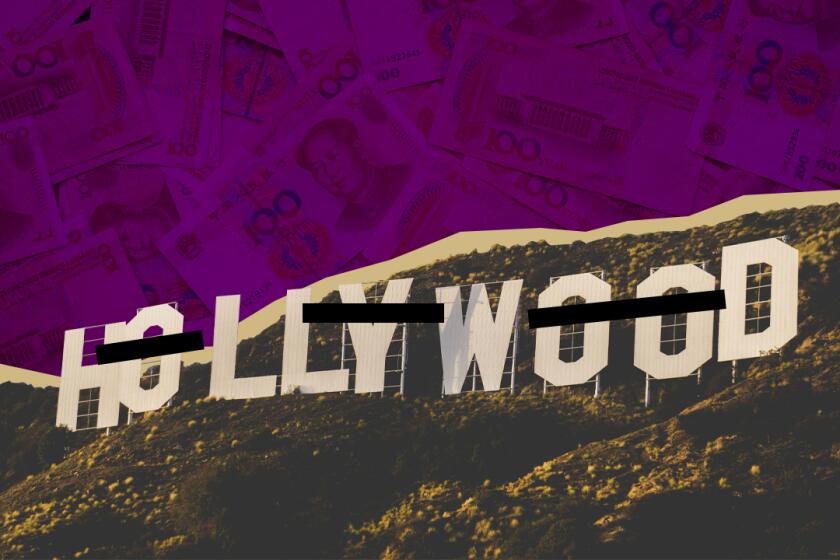China streamers scrub Keanu Reeves titles over his support for Tibet

- Share via
Actor Keanu Reeves may now be kaput in China, despite his past close collaboration with its film authorities and decades of mega-stardom spanning the length of the country’s engagement with Hollywood.
In the wake of his show of support for Tibet earlier this month, the “John Wick” and “Matrix” star has fallen afoul of the country’s strict censorship regime, placing his future career in the world’s largest film market in jeopardy.
In January, reports broke that Reeves would participate in a March 3 benefit concert for Tibet House, a New York-based nonprofit affiliated with the exiled spiritual leader, the Dalai Lama.
The development emerged just after his latest film “The Matrix: Resurrections” became the first blockbuster to hit Chinese theaters in over two months, ending an unusually prolonged drought of censorship approvals on U.S. titles in a year of rising geopolitical tensions and a further cooling of relations with Hollywood.
U.S. entertainment companies chased short-term profits while China’s propaganda apparatus played the long game. Guess who won.
Given that Beijing vehemently rejects any claims of Tibetan independence and views the Nobel Peace Prize laureate as a dangerous “separatist,” the news enraged Chinese nationalists, who stormed social media with insults, vowing to boycott the film. It remained in theaters, however, and March 3 came and went with no apparent consequences for Reeves.
But the axe has now fallen — albeit more quietly than many expected.
Last Monday, China’s major streamers removed the vast majority of Reeves’ filmography from their sites and wiped search results related to his name in Chinese — the cumbersome transliteration “Jinu Liweisi.”
“Sorry, no results related to ‘Keanu Reeves’ were found,” the platform iQiyi now states, adding: “Due to relevant laws, regulations and policies, some results are not shown.”
Deleted films include “The Matrix” trilogy, “Speed,” “Bill & Ted’s Excellent Adventure,” and romances including “Something’s Gotta Give” and “The Lake House.”
At least 19 films starring Reeves were removed from the Tencent Video platform, while all but one — “Toy Story 4” — were removed from other top streamers Youku and Migu Video. Sites like Bilibili and Xigua Video also saw purges. Though “Toy Story 4,” which features Reeves as the voice of motorcycle-riding stuntman Duke Caboom, remains online, its credits are unusual: They unfurl in English except for the voice cast, which alone switches over to Chinese and lists only the local dubbing cast, avoiding any mention of Reeves’ name.
“It’s a curious case that’s worth following. We tend to think of the censorship machine in China as this really coordinated monster, but the fact that we’re seeing these conflicting signals [between the online and theatrical markets] suggests that some of these measures come from different places,” said Alex Yu, a researcher at China Digital Times, a U.S.-based news organization that translates and archives content censored in China.
It’s unclear who ordered the deletions, China’s regulatory agencies or platforms acting proactively to remove potentially troublesome content, Yu said.
But Reeves, who played the Buddha Siddhartha Gautama himself in 1993’s “Little Buddha,” joins a long list of Western celebrities who have found themselves unwelcome in China after expressing support for Tibet — one that includes Richard Gere, Selena Gomez, Lady Gaga, and, for a few decades, Brad Pitt.
“Why all of a sudden did they decide to take this measure at this exact moment? It’s a question we as outsiders might never be able to answer,” Yu said. “The system is so opaque that it’s pretty much impossible to pinpoint which agency or person is responsible.”
None of the streamers replied to the Los Angeles Times’ request for comment. Representatives of Warner Bros. and Reeves declined to comment.
Now in its 35th year, the annual Tibet House Benefit Concert took place online for the second time in a row this year due to COVID-19. The draw for many participants is two-fold, says legendary composer and artistic director Philip Glass: honoring Tibetan culture and playing Carnegie Hall.
“The benefit concert allows artists from different genres to gather and collaborate in a way that is singular to this [event],” Glass said. “The wide range of talent is remarkable.”
Participants in this year’s show included Laurie Anderson, Patti Smith, Cyndi Lauper, Iggy Pop and Trey Anastasio. Their music, and Glass’, remains available to stream in China, where Glass’ works are still frequently performed nationwide.
A number of artists return regularly to anchor the benefit, including Anderson, Smith and, while he was still alive, poet Allen Ginsberg. One of his poems is now read in his memory each year. This year, the task fell to Reeves, who performed “Pull My Daisy,” a collaborative poem co-written by Ginsberg and fellow Beat Generation luminaries Jack Kerouac and Neal Cassady over the 1940s and ‘50s.
Anderson, herself a Buddhist since the 1970s, noted that starting with composer John Cage, the American avant-garde has long had ties to the religion.
“In Buddhism, no one’s in charge; there’s no hierarchy of any kind. It’s a very anti-authoritarian way to look at the world that certainly appeals to artists, and I think to a lot of Americans as well,” she said.
Although she would love as a practitioner of Chen-style Tai Chi to visit the martial art’s place of origin in central China, she readily admits that her involvement in activist events like the concerts makes the likelihood of such a visit slim.
It’s a price she’s willing to pay.
“Intimidation is difficult for people, but I think it just depends on how strongly you feel about supporting Tibet,” she said. “I personally was really horrified by the invasion and occupation of Tibet by the Chinese and don’t have any interest in making an economic statement or worrying about what my prospects are in China.”
The same typically hasn’t been true for Hollywood stars determining the box office outlook of big-budget franchises, such as “Fast & Furious” series lead John Cena, who made headlines last year for issuing a groveling apology for referring to the self-governed island of Taiwan as a country, contrary to Beijing’s position.
The ban on Reeves’ past works bodes poorly for the China prospects of his upcoming projects. These include animation “DC League of Super-Pets,” starring Chinese fan favorite Dwayne Johnson, and the pandemic-delayed sequel “John Wick: Chapter 4,” which appears to target mainland viewers with its top billing of Donnie Yen, the Hong Kong action star known for his expressions of loyalty to China’s ruling Communist Party.
“It’s a pity that I won’t be able to watch Keanu’s films on the Chinese big screen in the future,” predicted a Chinese moviegoer who asked to go by the pseudonym John due to the sensitive nature of discussing censorship. Yen had frequently praised Reeves in local interviews and shared content from the “John Wick 4” set on Chinese social media, appearing to be “very proud and happy” to be working with him.
Reeves’ willingness to put his China career at risk is surprising, given his deep ties to the country’s film industry. His 2013 directorial debut, “Man of Tai Chi,” was an official U.S.-China co-production widely promoted by the powerful state-owned production partner China Film Group. That year, Reeves’ firm Company Films signed a co-development deal with Shanghai-based Fundamental Films for more China-related projects.
Reeves has been a household name in China since the ‘90s, achieving extra visibility due to his Chinese-Hawaiian roots.
Those in their 30s and above know him best from his roles in “Speed” and “The Matrix” trilogy, which sparked a moviegoing boom, playing to sold-out, standing-room-only crowds when the country had far fewer screens. Those in their teens and 20s know him better from pirated viewings of the “John Wick” films — R-rated titles that have never released in China but still spawned a robust fandom and hundreds of memes — or from the popular video game “Cyberpunk 2077.”
Women, especially those born in the ‘80s and early ‘90s, swoon over Reeves’ dapper mien and kind, down-to-Earth persona that they feel separates him from other celebs, based on the same viral photos and interviews that have inspired American fans: Reeves morosely eating a sandwich alone on a park bench, conversing with a homeless man or giving a surprisingly heartfelt response to a talk show question about what happens in the afterlife.
There’s even an entire 2004 Cantopop hit by Hong Kong crooner Fiona Sit dedicated to pining after the mild-mannered Canadian: “A Reply Letter from Keanu Reeves.”
“Mr. K, could you stop for just 18 seconds to read my letter?” the song goes. “If you agree that people need to dream, send me your autograph in the mail, just one!”
He’s no Leonardo DiCaprio, but Reeves has a devoted cult following in China, says Hana Chen, a 27-year-old pop culture podcaster using a pseudonym due to the sensitive nature of discussing Tibet-related issues.
“Keanu Reeves became someone that Chinese fangirls would dream about — the embodiment of this perfect male idol: not very muscular, but with a tall and slim body that fits into this particularly East Asian standard of what’s hot, with Asian-like facial features,” she said. “His eye color, his facial lines — he looks strangely not foreign to a lot of people. He seems very gentle.”
She and her high school classmates would watch “Speed” in self-study period to de-stress from the pressure cooker of college exam prep, she recalled, but, like for thousands of others, it was the “groundbreaking” release of the first “Matrix” film that resonated with her.
Its depictions of leather-clad hackers and high technology felt a world apart from her extremely polluted city in Shanxi province. It also reflected a then-pervasive optimism about internet culture — one that now looks increasingly naive as Beijing tightens its stranglehold on the web.
“Back in the 2000s, everyone was stuck in this really teleological belief about China[’s development]. ‘The Matrix’ really felt like what my dad said it was: like a portal to something big and new outside of China that represented the future, modernity and all sorts of good things.”
“The Matrix Revolutions” made history as the first foreign film in China to release simultaneously with the West.
Despite the original trilogy’s popularity, “The Matrix: Resurrections” was a flop in China even before it faced nationalist backlash, grossing only $13.6 million and notching just 5.7 out of 10 on the taste-making ratings platform Douban.
Local discussion of Reeves’ online ban has been muted — surprising for a star of his caliber, yet not unexpected, given that discussion of Tibet-related topics is highly monitored . Fans desperate to know what happened to the actor use wordplay and emojis to evade censorship.
“The situation hasn’t attracted massive attention yet, but nationalism is so rampant in today’s society that if the Chinese government were to publicize this in state media, most Chinese people would definitely hate Keanu for it,” said a critic using the pseudonym Li to avoid professional backlash.
For loyal supporters, Reeves’ apparent willingness to act on his beliefs remains a badge of integrity.
“His values don’t align with mine, but I don’t live with the guy — my opinion of him doesn’t depend on the activities he participates in or opinions he holds,” said a movie-watcher who asked to be identified by her online username, wereyou. “If he’s consistent in his words and deeds, then I’ll continue thinking he’s worthy of my respect and admiration.”
More to Read
Inside the business of entertainment
The Wide Shot brings you news, analysis and insights on everything from streaming wars to production — and what it all means for the future.
You may occasionally receive promotional content from the Los Angeles Times.











